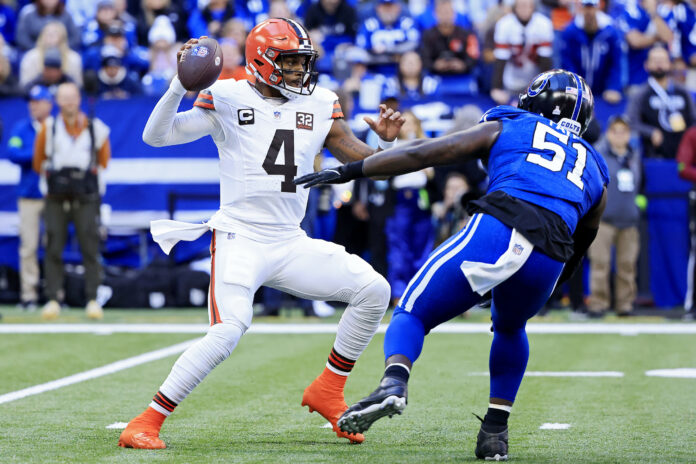In the modern NFL, having a talented quarterback is a key part of success. While there are some exceptions to the rule—the 2000 Baltimore Ravens defense was so good, for example, that Trent Dilfer earned a Super Bowl ring—the signal-caller is largely running the show.
That thought process is presumably what the Cleveland Browns were thinking when they acquired Deshaun Watson. Since the trade was consummated, though, things haven’t gone according to plan.
This is the NFL though, and teams can usually find ways to (legally) manipulate the salary cap to keep things moving. But in this case, the Browns are staring down a big-time issue.
Just how big are we talking? Try hundreds of millions of dollars in dead cap space.
Let’s break it down.
Justin Casterline/Getty Images
Watson Doesn’t Look Like the Answer in Cleveland
Given that the Browns are 4-2, it’s easy to say that the Deshaun Watson trade is paying off. In reality, though, the numbers don’t really match up with that perception.
During the 2022 campaign, Watson only started six games due to an NFL suspension. He went 3-3, throwing for 1,102 yards, seven touchdowns and five interceptions. 2023 hasn’t been much better. Injuries have limited the signal-caller to four starts, and he’s posted 683 passing yards, four touchdowns and three interceptions in those outings.
And those aforementioned injuries do seem to be something of a limiting factor. Watson missed Week 4 and Week 6 with a rotator cuff injury. He returned in Week 7 but struggled statistically (1-of-5 passing for five yards and an interception). He left the game after appearing to hit his head on the turf, and, despite being cleared to return, the starting QB stayed on the sideline.
After the game, head coach Kevin Stefanski said that he wanted to protect the franchise player; it’s not clear if he was concerned about Watson’s head or his shoulder. Either way, though, P.J. Walker remained in the game and led the Browns to victory.
And while it’s tough to hold an injury against Watson, production does matter.
Cleveland traded away multiple first-round draft picks, plus some additional selections, to acquire the quarterback. The club is paying him $230 million across the length of his contract, according to overthecap.com. If Watson isn’t performing at the level you’d expect from a franchise player, it’s fair to wonder if his cap hit could serve a better purpose. Starting in 2024, the signal-caller will count for nearly $64 million against the salary cap per season until he hits free agency in 2027.
That’s world-class player money; Watson, whether it’s his fault or not, hasn’t lived up to that billing.
Watson Can’t Be Cut Without Massive Consequences
Given that Watson’s current performances aren’t worth upward of $60 million per season, you might think that the Browns will try to get out of the contract.
Moving on, however, is easier said than done.
Simply cutting the quarterback seems like the most straightforward option; Cleveland presses the metaphorical button, and Watson is gone. Making that move right now, though, would decimate the club’s salary cap.
Let’s assume that the Browns want to make a change during the 2024 offseason. If the club wanted to cut Watson then (prior to June 1), they’d be on the hook for more than $200 million. That would account for most of the $256 million that Cleveland is allowed to spend for the entire roster in 2024.
Things would get a bit better if Watson was cut after June 1 (the dead money would only amount to roughly $156 million), but that’s still a massive sum to pay without adding anything to your roster.
Similarly, the burden of cutting the quarterback decreases in 2025 and 2026. That said, the minimum amount the Browns would be on the hook for is under $64 million. That’s not chump change and, at that point, the organization wouldn’t be saving money. Watson would essentially be earning his same salary to leave the team rather than playing.
But wait, you might be saying, what about a trade?
It’s true that trading Watson would allow Cleveland to turn the page without shouldering a massive financial burden, but there is a problem. For a trade to work, another team has to be interested. As noted above, the quarterback hasn’t exactly set the NFL alight since moving to Ohio.
Even if we’re focusing purely on on-field matters—Watson faced multiple sexual misconduct lawsuits, which could also prompt teams to keep their distance. He has denied the accusations. He was not charged criminally and has reportedly settled 23 of 26 lawsuits—he isn’t currently worth his massive salary. Even if another team wanted to take a flyer on the QB, Cleveland would probably have to retain a portion of the wage bill.
Once again, the club would be paying an exorbitant price for Watson to simply go away.
That all combines to leave the Browns trapped between a rock and a hard place. Watson isn’t living up to his salary, and that same guaranteed salary makes him largely unmovable.
To that end, the club had better hope that Watson returns to his best sooner rather than later. If he doesn’t, there’s simply not much the Browns can do to replace him.
Uncommon Knowledge
Newsweek is committed to challenging conventional wisdom and finding connections in the search for common ground.
Newsweek is committed to challenging conventional wisdom and finding connections in the search for common ground.


